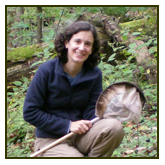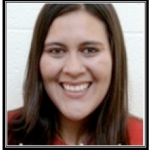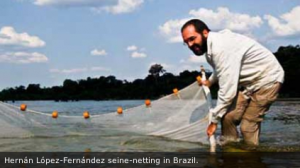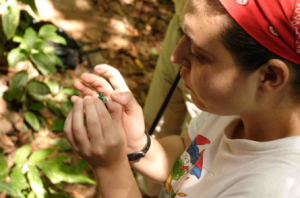Dr. Kelly Dyer will be giving a talk titled, ” Species interactions and the evolution of mate choice in Drosophila,” on Friday, April 4. Kelly earned her B.S. in Evolution and Ecology from UC Davis, her M.S. from the University of Arizona, and finally her Ph.D. from the University of Rochester. She spent three years at the University of Edinburgh in Scotland as a Royal Society USA Research Fellow before founding the Dyer Lab at UGA in November of 2007. While at UGA, Kelly has been a Lilly Teaching Fellow and she has received a CAREER award from the National Science Foundation and also a New Scholar in Aging Award from the Ellison Medical Foundation. Kelly is broadly interested in evolutionary genetics and molecular evolution.
Author Archives: dlawren5
EEB Seminar, March 28: “Reproductive isolation in Anolis lizards”
EEB Seminar, Friday, March 21: “Population genomics & molecular evolution in Caenorhabditis elegans”
EEB Seminar, Friday, March 7: “Lineage-specific genes in Spiralia”
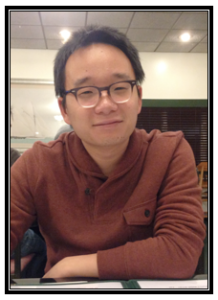 Longjun Wu, a graduate student in the Lambert lab, will be giving a talk entitled, “Lineage-specific genes in Spiralia,” on Friday, March 7. Longjun comes from the Southeast coast of China, where he received his B.S. in Biology from Xiamen University, studying genome evolution of Amphixous in Dr. Yiquan Wang’s lab.
Longjun Wu, a graduate student in the Lambert lab, will be giving a talk entitled, “Lineage-specific genes in Spiralia,” on Friday, March 7. Longjun comes from the Southeast coast of China, where he received his B.S. in Biology from Xiamen University, studying genome evolution of Amphixous in Dr. Yiquan Wang’s lab.
EEB Seminar, Friday, February 21: “Speciation and the large X effect”
EEB Seminar, Friday, February 14: “Evolutionary Genetics of the Selfish Segregation Distorter Complex”
 Cara Brand, a graduate student of the University of Rochester and member of the Presgraves Lab, is presenting a talk titled, “Evolutionary Genetics of the Selfish Segregation Distorter Complex,” on Friday, February 14. Cara received her B.S. in Biology from the University of Maryland, College Park. She then spent a year as research technician in Jerry Wilkinson’s lab, working on hybrid male sterility and meiotic drive in stalk-eyed flies. She is now studying the evolution and genetics of recombination and the selfish Segregation Distorter complex.
Cara Brand, a graduate student of the University of Rochester and member of the Presgraves Lab, is presenting a talk titled, “Evolutionary Genetics of the Selfish Segregation Distorter Complex,” on Friday, February 14. Cara received her B.S. in Biology from the University of Maryland, College Park. She then spent a year as research technician in Jerry Wilkinson’s lab, working on hybrid male sterility and meiotic drive in stalk-eyed flies. She is now studying the evolution and genetics of recombination and the selfish Segregation Distorter complex.
EEB Seminar, Friday, February 7: “Ancient adaptive radiations and morphological convergence in Neotropical cichlid fishes”
Dr. Hernán López-Fernández will be giving a talk titled, “Ancient adaptive radiations and morphological convergence in Neotropical cichlid fishes,” on Friday, February 7. He is a Curator of Ichthyology in the Department of Natural History at the Royal Ontario Museum in Toronto, Canada. As a Curator at the ROM, Hernán’s research focuses on the evolutionary biology of South and Central American cichlids. The freshwaters of South and Central America are estimated to harbor well over 6,000 species of fishes, more than any other biogeographic region on Earth. Among this great diversity, cichlid fishes are remarkable for their morphological, ecological and behavioral diversity. Although cichlids are well-known models of adaptive evolution in lakes, little is known about their diversification in rivers. Hernán combines field and laboratory research in systematics, biogeography and evolutionary biology to study the radiations of American cichlids as models of the evolutionary history of Neotropical fishes. Comparative evolutionary studies of cichlids and other groups should provide a powerful tool to understand the origin of the most diverse freshwater fish fauna on the planet.
EEB Seminar, Friday, January 31: “Genetic signatures of range expansion of the host-plant specialist squash bee, Peponapis pruinosa”
Dr. Margarita Lopez-Uribe will be giving a talk titled, “Genetic signatures of range expansion of the host-plant specialist squash bee, Peponapis pruinosa,” on Friday, January 31. She obtained her Bachelor’s degree in Biology at Universidad de los Andes (Colombia) in 2004 and her Masters degree in Genetics and Evolution at Universidade Federal de São Carlos (Brazil) in 2006 under the supervision of Dr. Marco Antonio Del Lama. Currently, she is a PhD student of the Entomology Department at Cornell University researching genetics and population structure of solitary bees. Her particular interest is in understanding the historical and current role of geography and landscape in shaping gene flow patterns and population structure of bees. For more information on this research, please visit her website.
EEB Seminar, Friday, January 24: “Posterior patterning in Spiralia: caudal’s role in Ilyanassa”
 Adam Johnson, a member of the Lambert lab, will be giving a talk titled, “Posterior patterning in Spiralia: caudal’s role in Ilyanassa” on Friday, January 24. Adam received his Biology BA at the University of Kansas, and worked with Jennifer Gleason and Paulyn Cartwright on mating behavior and Cnidarian sensory evolution, respectively. Adam is a 3rd year PhD student.
Adam Johnson, a member of the Lambert lab, will be giving a talk titled, “Posterior patterning in Spiralia: caudal’s role in Ilyanassa” on Friday, January 24. Adam received his Biology BA at the University of Kansas, and worked with Jennifer Gleason and Paulyn Cartwright on mating behavior and Cnidarian sensory evolution, respectively. Adam is a 3rd year PhD student.

